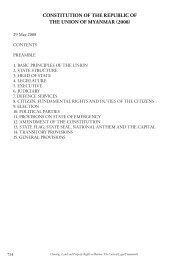Myanmar at the HLP Crossroads: - Displacement Solutions
Myanmar at the HLP Crossroads: - Displacement Solutions
Myanmar at the HLP Crossroads: - Displacement Solutions
Create successful ePaper yourself
Turn your PDF publications into a flip-book with our unique Google optimized e-Paper software.
<strong>Myanmar</strong> <strong>at</strong> <strong>the</strong> <strong>HLP</strong> <strong>Crossroads</strong> 4Many within <strong>the</strong> country may believe th<strong>at</strong> <strong>the</strong> new political openness, <strong>the</strong> Government’s avowed aim of significantlyboosting GDP growth, much anticip<strong>at</strong>ed foreign investment, promulg<strong>at</strong>ion of new pro-business land laws(as occurred in March 2012) and gradual priv<strong>at</strong>is<strong>at</strong>ion in <strong>Myanmar</strong> will resolve <strong>the</strong> country’s multifarious <strong>HLP</strong>challenges in a fair and equitable manner consistent with <strong>the</strong> rights of <strong>the</strong> people concerned. However, history in arange of o<strong>the</strong>r countries th<strong>at</strong> have undergone major political reforms shows unequivocally th<strong>at</strong> such assumptionsare misguided. Indeed, r<strong>at</strong>her than improve <strong>the</strong> <strong>HLP</strong> prospects of ordinary citizens, deep political reforms th<strong>at</strong> arepremised exclusively on market-gener<strong>at</strong>ed, largely non-transparent decision-making processes on <strong>HLP</strong> questions,without public particip<strong>at</strong>ion or consult<strong>at</strong>ion, tend to result in even gre<strong>at</strong>er land inequality, larger-scale landgrabbing, more frequent and often violent forced evictions, increased housing poverty, worsening access to basicservices linked to housing, reduced tenure security and a vast array of additional <strong>HLP</strong> concerns th<strong>at</strong> undermineboth <strong>the</strong> enjoyment of human rights as well as <strong>the</strong> broader economic prospects of <strong>the</strong> countries concerned. (2)It is clear, based on extensive research, interviews and field visits in <strong>Myanmar</strong>, th<strong>at</strong> after eighteen months ofreform, many positive steps forward and a fundamental change in approaches to governance, <strong>the</strong> country isfacing major <strong>HLP</strong> challenges today. Without prompt and appropri<strong>at</strong>e action, <strong>the</strong>se challenges will inevitablyspark future crises within <strong>the</strong> <strong>HLP</strong> sector, which will thre<strong>at</strong>en both <strong>the</strong> reform process and overall economic andsocial vitality. Growing foreign investment and a number of o<strong>the</strong>r changes have already begun to cre<strong>at</strong>e conditionswithin <strong>the</strong> <strong>HLP</strong> sector th<strong>at</strong> fur<strong>the</strong>r thre<strong>at</strong>en <strong>the</strong> <strong>HLP</strong> rights of ordinary citizens and <strong>HLP</strong> rights holders. Given<strong>the</strong> experience gained globally in addressing <strong>HLP</strong> issues within <strong>the</strong> context of political transition during <strong>the</strong> pasttwo decades, it is clear th<strong>at</strong> even if political reforms in <strong>Myanmar</strong> continue apace, gre<strong>at</strong> care will need to be takenin <strong>at</strong>tempting to deal with <strong>HLP</strong> <strong>the</strong>mes. Given <strong>the</strong> unique history of <strong>the</strong> country, its massive economic and developmentpotential, <strong>the</strong> still largely unresolved peace processes in many ethnic areas, and <strong>the</strong> country’s widespreadpoverty and growing landlessness, many of <strong>Myanmar</strong>’s 60 million ordinary citizens stand a very considerablechance of suffering an even worse crisis within <strong>the</strong> <strong>HLP</strong> sector if measures are not taken in <strong>the</strong> short- tomedium-terms to build capacity within civil society and Government to address <strong>HLP</strong> challenges in <strong>the</strong> mostequitable manner possible.This report builds on a series of earlier efforts, including a 1245-page book prepared by <strong>Displacement</strong> <strong>Solutions</strong>in 2009 th<strong>at</strong> for <strong>the</strong> first-time compiled all of <strong>the</strong> 94 laws in place <strong>at</strong> <strong>the</strong> time in <strong>Myanmar</strong> which have a bearing on<strong>the</strong> realis<strong>at</strong>ion of <strong>HLP</strong> rights. (3) The analysis th<strong>at</strong> follows provides a brief overview of <strong>the</strong> most pressing <strong>HLP</strong> challengesfacing <strong>Myanmar</strong> <strong>at</strong> <strong>the</strong> moment, and examines <strong>the</strong> legisl<strong>at</strong>ive framework for addressing <strong>the</strong>se concernscombined with more thorough analysis of recent <strong>HLP</strong> legisl<strong>at</strong>ive developments. The report concludes with aseries of concrete recommend<strong>at</strong>ions designed to assist <strong>the</strong> Government to improve <strong>the</strong> overall <strong>HLP</strong> legisl<strong>at</strong>iveand policy framework in a manner th<strong>at</strong> provides protection and respect for <strong>the</strong> <strong>HLP</strong> rights of <strong>the</strong> entire popul<strong>at</strong>ionof <strong>the</strong> country, while simultaneously providing a solid basis for economic development, as well as n<strong>at</strong>ional andintern<strong>at</strong>ional investment.(2) See, for instance: Scott Leckie (ed) Conflict and Housing, Land and Property Rights – A Handbook on Issues, Frameworks and <strong>Solutions</strong>,(Cambridge University Press, 2011) and Scott Leckie (ed) Housing, Land and Property Rights and UN Peace Oper<strong>at</strong>ions – A Compar<strong>at</strong>iveSurvey and Proposals for Reform (Cambridge University Press, 2008).(3) Scott Leckie and Ezekiel Simperingham, Housing, Land and Property Rights in Burma: The Current Legal Framework (<strong>Displacement</strong> <strong>Solutions</strong>& <strong>HLP</strong> Institute, 2009). The prepar<strong>at</strong>ion of this book was made possible thanks to a generous grant from <strong>the</strong> Swiss Federal Department ofForeign Affairs (FDFA).













